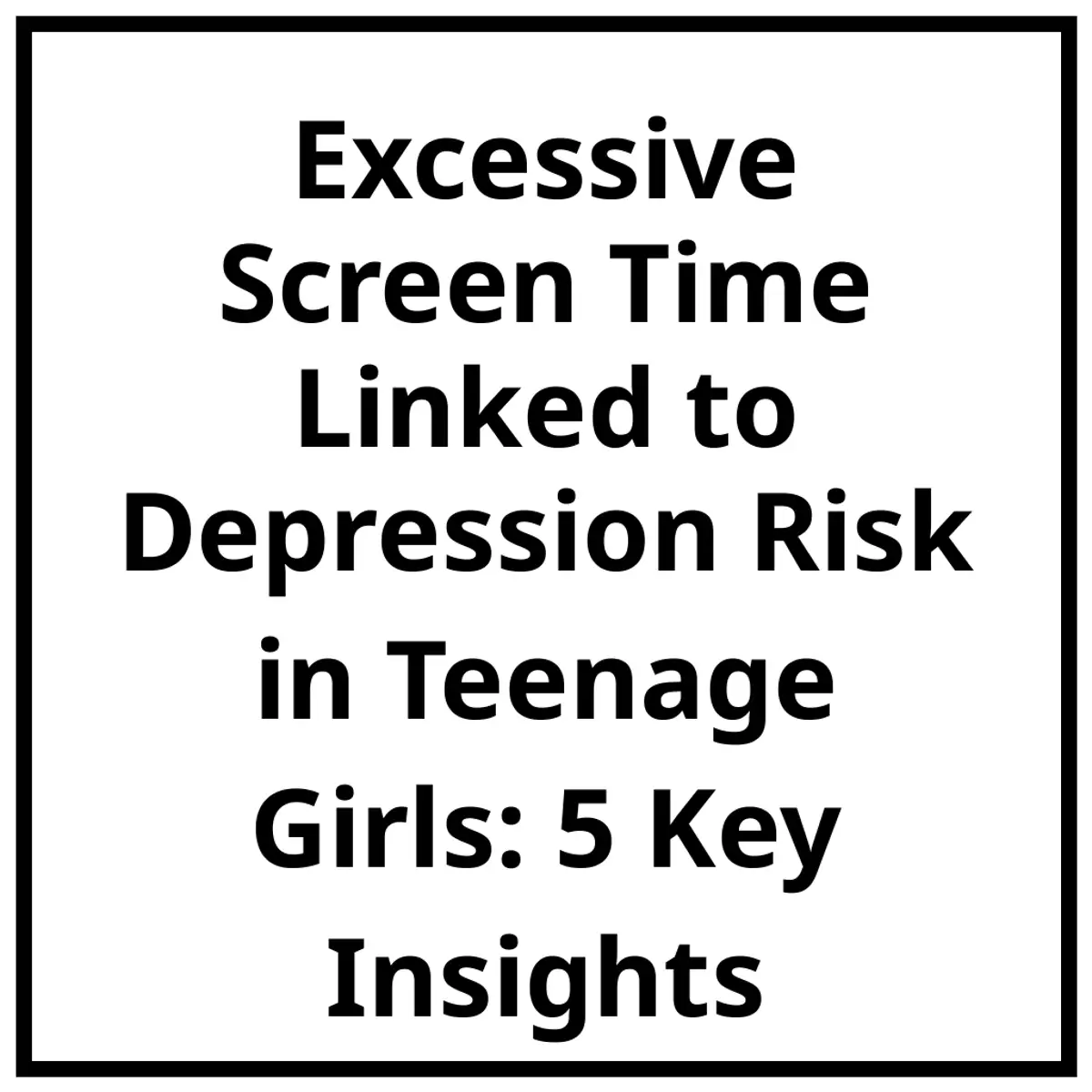Discover the connection between excessive screen time and depression risk in teenage girls. Learn the latest findings, impact on sleep, and strategies for healthier screen habits.

In recent years, the impact of screen time on mental health has become increasingly concerning, particularly among young people. A new study reveals a troubling trend: excessive screen time is significantly linked to sleep deprivation and heightened depression risk in teenage girls. This article will delve into the background of this issue, explore the key findings from recent research, and examine the broader implications for public health and personal well-being.
Read Also – 👉👉Cancer Immunotherapy Breakthroughs: A Groundbreaking Method to Expose Cancer Cells to the Immune System👈👈
Understanding the Issue: How Excessive Screen Time Connects to Depression
The Rise of Digital Devices and Its Impact
The proliferation of digital devices has led to an unprecedented rise in screen time among adolescents. While screens offer numerous benefits, such as educational resources and social connectivity, excessive use is now recognized as a significant risk factor for mental health issues, including depression. Recent studies have specifically highlighted the impact on teenage girls, suggesting that the effects are gender-specific and mediated by factors like sleep quality.
Sleep Disruption as an Intermediary
The relationship between screen time and mental health is deeply intertwined with sleep patterns. Research indicates that increased screen time, particularly before bed, disrupts sleep cycles. Poor sleep not only detracts from physical health, corroding energy levels and attention spans, but it also has profound implications for emotional regulation and psychological stability. For teenage girls, lacking sufficient sleep can exacerbate stress, significantly increasing their susceptibility to depression.
Recent Findings: The Karolinska Institutet Study
Key Findings from the Study
- The Karolinska Institutet tracked over 4,800 adolescents aged 12 to 16 over a year.
- Increased screen time consistently linked to poorer sleep habits.
- Higher depressive symptoms were noted specifically in girls correlated with extended screen usage.
- Boys experienced depressive symptoms related to screen time but not as directly impacted by sleep disruption.
- Sebastian Hokby, the lead researcher, emphasizes the significance of sleep in managing these risks.
Addressing the Implications: A Call to Action
Public Health Recommendations
The implications of these findings are profound. They stress the importance of addressing excessive screen time as a public health issue. The Swedish Public Health Agency recommends limiting recreational screen use to two to three hours daily, which could serve as a robust model for other countries. Implementing such guidelines is vital for fighting the rising tide of depressive symptoms among adolescents.
Personal and Societal Consequences
On a personal level, excessive screen time can create a harmful cycle of sleep deprivation and escalating mental health issues. Societally, this trend could amplify mental health challenges, having long-lasting impacts on educational performance, relationships, and overall well-being among youth. Caregivers and educators are crucial players in fostering healthy screen habits by encouraging alternatives like physical activities and face-to-face interactions.
Future Directions: Navigating the Digital Landscape
Strategies for Healthier Screen Habits
- Encourage physical activities and hobbies outside of screen use.
- Schools should introduce digital literacy and mental health awareness programs.
- Parents should monitor and limit daily screen time for their children.
- Promote open discussions about emotional well-being and screen usage.
- Tailor interventions to address the specific needs of teenage girls.
Conclusion
The link between excessive screen time, sleep deprivation, and depression in teenage girls is a pressing concern. As technology continues to integrate into daily life, it becomes increasingly crucial to establish a balance between its benefits and risks. By fostering awareness of the issue, implementing effective guidelines for screen use, and introducing gender-sensitive interventions, we can help create healthier digital habits for adolescents, safeguarding their mental well-being.
FAQs
What is the study about excessive screen time and depression in teenage girls?
A recent study by the Karolinska Institutet examined how excessive screen time is linked to sleep deprivation and an increased risk of depression in teenage girls. It tracked over 4,800 adolescents and found that high screen usage could disrupt sleep, leading to mental health issues.
How does excessive screen time affect sleep?
Increased screen time, especially before bedtime, can disrupt natural sleep cycles, resulting in poorer sleep quality and duration. This lack of sleep is closely associated with heightened depression symptoms.
What can parents do to mitigate the effects of screen time on mental health?
Parents can monitor and limit their children’s screen time, promote physical activities, encourage social interactions, and have open conversations about emotional well-being and the effects of screen use.
Related Videos
Read Also –
This article is for informational purposes only and is not a substitute for professional medical advice. If you or someone you know is struggling with depression or other mental health issues, please seek professional help.
Read Also –
Hey! I hope you enjoyed reading this! If you did, could you do me a small favor and hit the like button? It would mean a lot to me and help me reach more people. Thank you so much! Got any thoughts on this post? Drop them in the comments below!
How many stars would you give for my effort?





